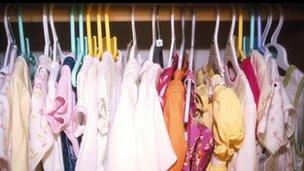Child benefit loss 'will see parents cut necessities'
- Published

The Child Poverty Action Group says parents spend child benefit on children's clothes and other necessities
Changes to child benefit payments will leave many parents cutting back on vital necessities, a campaign warns.
From January 2013 couples with at least one parent earning more than £42,745 a year - the 40% tax rate threshold - will lose their child benefit payments.
But the Child Poverty Action Group (CPAG) says the changes unfairly target couples with children, and women.
In a survey, CPAG found 51% of respondents spent the benefit on shoes and clothes for their children.
The survey of 642 parents, conducted by pollsters Populus, found just over a quarter (26%) spent the money on food.
A fifth (16%) said they spent it on their children's education, such as books and trips, and 9% spent it on baby products, such as nappies.
"I use the whole child benefit in July and August specifically for school uniform," one mother told the survey.
"Child benefit helps me provide shoes for my children… correct fitting ones can cost £30-plus per child," said another.
'We all benefit'
The CPAG report, entitled Save Child Benefit, says changes to the way the allowance is distributed shows a lack of respect for families.
"Child benefit is our way of making sure that the whole community contributes something towards the costs of a child, because we all benefit from children," the report says.
"Everyone - childless people, as well as those with children - will eventually benefit from the productivity of today's children, so society should share the cost of bringing them up."
The report says children should not be targeted in the drive to reduce demands on the public purse.
"These changes are unfair as children, and families with children, are being targeted to deal with the economic deficit.
"Where families are using child benefit as a valuable part of the family kitty, to pay for bills and utilities, this may mean that families themselves start cutting back on vital necessities."
Mothers
The CPAG campaign says child benefit is usually paid to the main carer, generally mothers, giving them an important "sense of independence and recognition" of the value of the caring work they provide.
One mother told the researchers: "As a stay-at-home mum, it gives me an income to take my kids to groups etc, without the indignity of asking my husband for money."
The report also says the changes unfairly targets those families where one partner has decided not to return to work after starting a family.
One parent said: "We have one wage earner just over the threshold and can't make ends meet currently. This is our emergency fund."
The researchers found some couples planned to change their working arrangements to escape losing the benefit.
"My husband will be going to a four-day week so that his salary falls below the cut-off, and I will go out to work that day instead," one mother told them.
"Not ideal by any means, but £3,000 is a lot of money."
'Fatally flawed'
Alison Garnham, chief executive of CPAG, said: "The policy was fatally flawed from the outset.
"Tinkering with the policy won't solve all the problems and will make child benefit too complex and costly to administer, so the plans should be dropped altogether.
"If the government wishes to target higher-rate taxpayers it would be simpler and fairer to do it through progressive taxation so that households without children share the burden."
But a spokesman for the Treasury said: "The government has been clear that it is fair to ask those who are better off in our society to make a contribution to paying down the debts that we have built up over the last decade in Britain.
"It is not fair to ask someone earning £20,000 to pay for the child benefit that goes to someone earning more than twice that much."
The change to child benefit entitlement is expected to save the Treasury about £1bn.
Details of how the change will be introduced are expected to be revealed in Chancellor George Osborne's Budget on 21 March.
On Tuesday the Deputy Prime Minister, Nick Clegg, said the government would "look at" the way the change was administered.
The Treasury dismissed as "pure speculation" reports that the chancellor is considering softening the impact of the child benefit reforms on middle-income families by raising the earnings threshold at which it will be withdrawn to £50,000 or even £80,000.
- Published5 March 2012
- Published5 March 2012